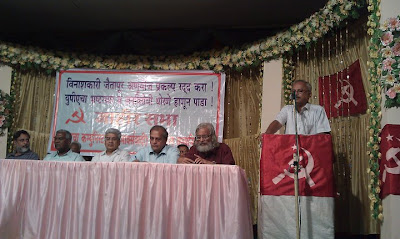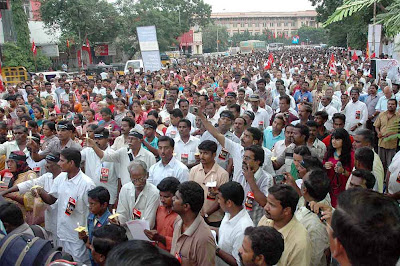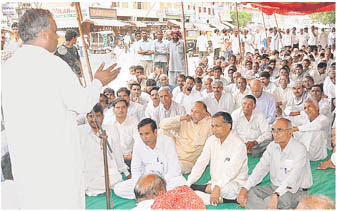
On July 12, a delegation of the Left parties comprising CPI(M) general secretary Prakash Karat and central committee member Tapan Sen, MP, CPI national secretary D Raja, MP, PWP leader Dhairyasheel Patil, MLA, and Dr Ashok Dhawale, Mahendra Singh, Kiran Moghe, Dr Vivek Monteiro, Hemkant Samant of the CPI(M), Narayan Ghagare, Prakash Reddy, Uday Chaudhary of the CPI; along with Adwait Pednekar and Mangesh Chavan of the Konkan Bachao Samiti visited villages in Ratnagiri district that will be affected by the proposed Jaitapur Nuclear Power Project (JNPP).
This visit could well become a landmark in the struggle to stop the ill-considered nuclear project.
After the Fukushima disaster, serious questions have been raised internationally about the hazards arising out of situating multiple nuclear reactors at a single location. First Germany and subsequently Japan announced plans to cancel all new nuclear projects and further, to make a phased exit from nuclear power. In this backdrop the assertion by Prime Minister Manmohan Singh that there will be no reconsideration of the JNPP and that the project will go forward as scheduled makes it crystal clear that what is driving the project forward is not economic or scientific rationality, but international political compulsions.
Those opposing the project are also beginning to understand that the only way to stop the project in these circumstances is to defeat politically the forces which are pushing it forward against all wisdom. This political battle will have to be fought at the local, state and national level. It is in this context that the visit of Comrades Prakash Karat, D Raja and Tapan Sen to express support of the Left parties to the movement to stop the Jaitapur project assumes great importance.
The first item on the day’s agenda was a visit to the plateau above the fishing village of Musakazi which is situated across the Jaitapur creek from the Madban plateau. This plateau is similar topographically to the Madban proposed site for the JNPP. Here the delegation and accompanying media were shown several places where deep cracks and rifts had developed in previous decades due to seismic events or after heavy rains as is common in laterite rocks. Shri Pravin Gawhankar, President of the Janahit Sewa Samiti which is spearheading the agitation, raised several safety issues related to the development of these large cracks and land subsidence when rain- soaked laterite rock is stressed with large loads such as mammoth nuclear reactors.
The next stop was at the picturesque village of Sakhri-Nate. This fishing village is prosperous and self-sufficient. Most of its residents are Muslims. This was where young Tabrez Sayekar fell martyr to police bullets on April 18 this year. Tabrez’ martyrdom followed the killing of Irfan Kazi in December 2010 by collision with a police vehicle. The death of Irfan and the martyrdom of Tabrez have made a profound impact on the consciousness of the local residents. The delegation first visited the humble home of Tabrez and paid condolences to his aged father and mother. D Raja inquired whether any compensation had been paid to the family. He was informed that not a single ruling party Minister, leave alone the Chief Minister, had visited the family after the tragedy. No compensation had been offered.
A large crowd of several hundred people gathered at the Jamaatkhana eager to narrate their problems and plight. Shri Amjad Borkar, a resident of the village, and the President of the Ratnagiri District Machhimar Kruti Samiti, who is normally a very quiet and reserved person, made an impassioned speech stating that Tabrez’s father had told him that he too would be prepared to lay down his life like Tabrez, but the Jaitapur Nuclear Project must be stopped. Narrating his visit to the site of Tarapur plant Borkar asked what should we believe: the assurances of the government that fishing will not be affected, or the actual experience of our fisher community brothers and sisters at Tarapur whose livelihoods have been destroyed?
Yasmeen Bhosar, a woman gram panchayat member challenged the NPCIL propaganda. They are fooling us, she said, and banning the entry of those who are telling us the truth. She asked the leaders to take steps to stop the construction work of the wall which has started. Maulana Naeem received a resounding ovation when he stated that “these are the Left leaders who opposed the Congress in Parliament on the nuclear deal issue without compromise. They were prepared to give up power, but not their principles”. He stated that people here have set aside all differences of religion, community, political allegiance. They have forgotten Hindu-Muslim and Congress- ShivSena - “Yeh sirf hakk ki baat hai”. He said that fishing provides livelihood not only to thousands of Konkan residents but also to an even larger number of workers on the boats who come from Karnataka, Orissa and Nepal. “Sab ka pet bharta hai yahan.” Majeed Gowalkar who was next to Tabrez when he was shot narrated how the police opened fire without any warning. “Jo bachha mar gaya, wo poore gaon ka bachha tha”, he said with tears in his eyes.
Heavy rain compelled the meeting to adjourn briefly and people crammed into the Jamaatkhana. Here they were addressed by the leaders of the delegation. Dhairyasheel Patil of the PWP narrated how the struggle of the local farmers was able to successfully stop the huge Mukesh Ambani SEZ in the adjoining Raigad district. He exhorted the residents to be firm and not be demoralized if a few persons accept compensation. D Raja stated that the left parties had already raised the issue in Parliament and would again raise it forcefully in the coming session in August.
 Prakash Karat stated that the issue of Jaitapur is not only a local issue. It is a national issue. The Left parties had come to express their solidarity with the local struggle. Similar struggles are taking place at Andhra Pradesh and elsewhere. The Left will play its role in building a national resistance. The Left is opposed to all the projects based on expensive and untested imported reactors. After the Fukushima disaster we demand that all new nuclear projects be put on hold and a fresh examination be conducted including scrutiny by independent experts.
Prakash Karat stated that the issue of Jaitapur is not only a local issue. It is a national issue. The Left parties had come to express their solidarity with the local struggle. Similar struggles are taking place at Andhra Pradesh and elsewhere. The Left will play its role in building a national resistance. The Left is opposed to all the projects based on expensive and untested imported reactors. After the Fukushima disaster we demand that all new nuclear projects be put on hold and a fresh examination be conducted including scrutiny by independent experts.The next stop was a visit to the site of the JNPP on the Madban Plateau. Due to prohibitory orders it was decided that only five persons, Prakash Karat, D Raja, Tapan Sen, Dhairyasheel Patil and Pravin Gawhankar should go into the site. A large posse of police stood guard. Objections were taken by them to Gawhankar’s entry. However, after a brief discussion, the leaders along with Gawhankar were escorted by NPCIL officers and given a tour of the site.
Next was a visit to the village of Mithgawane, in the project-affected area. Another meeting was held in the ancient and beautiful Anjaneshwar temple at the village. Here Dr Milind Desai, a respected physician, narrated how he was arrested at midnight and kept in police custody for several days. His case was typical, he said. The state government is trying to thus terrorise and pressurise the local people into abandoning their agitation. Dhairyasheel Patil, D Raja, Tapan Sen and Prakash Karat assured the project-affected residents that their problems would be raised at the national level including in the next session of Parliament.
The culmination of the visit was the public meeting at the Ratnagiri City Library Hall at 6 PM. It was the first public meeting in the last several years that was organised by the Left in the south Konkan districts. Only two days earlier on July 10, activists of the Youth Congress and Minister Narayan Rane’s “Swabhimaan Sena” had disrupted a daylong workshop organised at the same venue by the Konkan Vinashkari Prakalp Virodhi Samiti, a coalition of groups opposing the JNPP. The Congress goons made a public announcement in the district papers that if the leaders of the KVPVS came to attend the Left parties’ public meeting they would not allow the meeting to take place.
However their attempt to disrupt the meeting was effectively foiled by the strong mobilization of the Left. A large contingent of working people from Ratnagiri including fisher folk, youth and women from Nate, farmers, members of the teachers union BUCTU, CITU members from the Ratnagiri Gas and Power Project, CPI(M) comrades from the neighbouring Kolhapur district led by state committee members Dr Subhash Jadhav and Chandrakant Yadav, as well as local citizens was significant in this effort. Leaders of the KVPVS like Ms Vaishali Patil, Dr Vivek Bhide and Amjadbhai Borkar were securely escorted into the hall by cordons of activists. The heavily outnumbered Congress goons shouted slogans and threw a few stones. They were not allowed to enter the meeting premises and were later dispersed by the police.
The meeting was presided over by CPI(M) state secretary Dr Ashok Dhawale and was addressed by Mahendra Singh, Kiran Moghe, Tapati Mukhopadhaya, Narayan Ghagare, Prakash Reddy and Pravin Gawhankar, along with Tapan Sen, D Raja and Prakash Karat.
Ashok Dhawale said that the Left parties had already commenced to take the agitation beyond the confines of Ratnagiri district. On April 26, the 25th anniversary of Chernobyl Day, the Left parties had held demonstrations in several districts of Maharashtra. In March, our CPI(M) MP Khagen Das and ex-MP Subhashini Ali had visited the area and Khagen Das had raised the issue in Parliament. Kiran Moghe said that this meeting has shown that strong arm tactics will never be able to stop the spread of our movement. She commended the women for their large scale participation in the struggle. Mahendra Singh stated that those who think they can terrorise us into silence should understand that we will never let the martyrdom of Irfan and Tabrez go in vain. Narayan Ghagare in a speech laced with sarcasm and humour delivered in characteristic Konkani style and accent stated that he too is a Narayan from Konkan. Shri Narayan Rane must realize that if he attacks the Konkani people who are fighting for their rights and livelihood, his party’s victory in the last Lok Sabha election will be its last election victory in the Konkan. Prakash Reddy and Tapati Mukhopadhyaya both raised the important issue of the impact of the JNPP on the livelihoods of the fishing community and the world famous Ratnagiri alphonso mango horticulture. Pravin Gawhankar thanked the Left parties for their continued and consistent support. He said that from 2005 itself both the Left parties and the local residents have been consistently opposing the anti-national nuclear policy sell-out to multinationals on different platforms. Now we are coming together.
 Tapan Sen stated that the CITU and other trade unions will mobilise their members to oppose the project which is anti-national and the result of political corruption. The strength of the working class would be rallied to support the agitation. Prakash Karat and D Raja reiterated and elaborated upon the points that they had made in their speeches at Nate. Prakash Karat made the important announcement that the Left parties will immediately take the initiative to form a broad-based national committee to take forward this struggle.
Tapan Sen stated that the CITU and other trade unions will mobilise their members to oppose the project which is anti-national and the result of political corruption. The strength of the working class would be rallied to support the agitation. Prakash Karat and D Raja reiterated and elaborated upon the points that they had made in their speeches at Nate. Prakash Karat made the important announcement that the Left parties will immediately take the initiative to form a broad-based national committee to take forward this struggle.On July 13, Prakash Karat and D Raja addressed a crowded press conference at the Mumbai Marathi Patrakar Sangh. The large hall was so crammed with reporters of the print and electronic media that several had to wait outside. The public meeting at Ambedkar Bhavan at Dadar was also filled to capacity. Dr. Bhalchandra Kango, state secretary of the CPI, presided over the meeting. Pravin Gawhankar spoke first. He thanked the Left parties for their consistent support and requested their backing for a protest dharna to be organised by the Janahit Sewa Samiti at New Delhi on August 9 with the slogan “Videshi Nuclear Projects, Quit India”. D Raja had just completed his speech when the news came in of the serial bomb blasts in Mumbai, including one at Dadar Kabutarkhana nearby. Prakash Karat announced this shocking news, and the meeting adjourned immediately after condemning the terrorist attack and condoling the deaths of innocent citizens.























